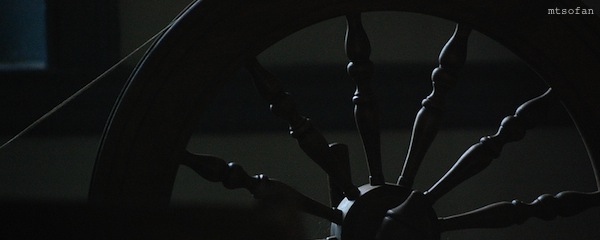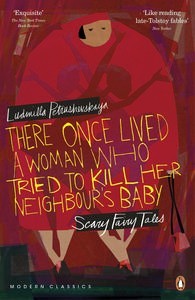
photo by mtsofan
by Pauline Masurel
Traditional fairy tales feature magical objects, spells and special powers. The stories in Ludmilla Petrushevskaya’s There Once Lived a Woman Who Tried to Kill Her Neighbour’s Baby: Scary Fairy Tales collection swerve between the realist-expected and the magical-surreal – often involving equally powerful forces such as disease, alcohol, vandalism, war and mental illness. Instead of fingers pricked whilst spinning, or princesses stowed away in towers, these stories feature more modern dangers and incarcerations.
In ‘Revenge’, ‘As the child grew and learned to crawl, the woman would sometimes leave a pot of boiling water in the corridor, or a container full of bleach, or she’d spread out a whole box of needles right there in the hall’. In ‘The Old Monk’s Testament’, an impoverished monastery is ‘a popular target for local kids who needed money for vodka’. In ‘Hygiene’, the story from this collection which continues to haunt me most, the parents of a little girl lock her away to prevent the spread of a disease.
 These stories are rarely overtly political, and only occasionally conventionally moralistic, but the craziness of social and individual human injustice often reminds me of works by Kafka or Ariel Dorfman, where characters become inadvertently caught up in machinery beyond their own control. There is a strong focus on women’s lives, with the stories often being told from a female point of view. Some stories have distinct emerging morals, such as tit-for-tat revenges. But more common are subtler emerging messages, such as the discovery that once you begin trying to escape from the world for your own safety (as in ‘The New Robinson Crusoes’) then you will have to go on escaping forever as the world will come after you, seeking its own safety too. Once you shut yourself away from human interference (as in ‘Hygeine’) you also miss out on humanitarian help.
These stories are rarely overtly political, and only occasionally conventionally moralistic, but the craziness of social and individual human injustice often reminds me of works by Kafka or Ariel Dorfman, where characters become inadvertently caught up in machinery beyond their own control. There is a strong focus on women’s lives, with the stories often being told from a female point of view. Some stories have distinct emerging morals, such as tit-for-tat revenges. But more common are subtler emerging messages, such as the discovery that once you begin trying to escape from the world for your own safety (as in ‘The New Robinson Crusoes’) then you will have to go on escaping forever as the world will come after you, seeking its own safety too. Once you shut yourself away from human interference (as in ‘Hygeine’) you also miss out on humanitarian help.
In ‘The Father’, there are dark woods and an abandoned hut, familiar icons from Goldilocks, and yet, unlike so many of these tales which focus upon female experience, it is a man who enters this place seeking his unknown children. Unlike a conventional fairy tale he has arrived here by train. In ‘The Cabbage-patch Mother’, her magical cabbage-patch baby, Droplet, transforms from something enchanting into a gross, mewling infant, perhaps an allegory for the dashing of maternal expectations.
Petrushevskaya’s work has been likened to that of both Tolstoy and Checkov, but if this recommendation sounds a bit ‘worthy’ for your liking then don’t assume there is anything tricksy or inaccessible about this collection. These stories span many years and so it is not always clear which relate to Soviet or post-Soviet life – but there are many aspects of these stories which seem characteristically Russian, even if the impact of the writing is more universal. They are divided into four separate groups: Songs of the Eastern Slavs, Allegories, Requiems and Fairy Tales. Frankly, I didn’t find that these distinctions meant much to me as a reader, as many of the themes and characteristics of the stories are common throughout the collection.
There’s an odd editorial quirk in the UK edition of this book. The ‘Neighbor’ of the American edition title has been deliberately rendered as ‘Neighbour’ and similarly spelled in British-English throughout the text. However American-English spelling has been used elsewhere. People ‘labor’, ‘plow’ and ‘apologize’. I sometimes found myself becoming distracted by obsessively trying to spot these transatlantic shifts.
 Quite a number of the stories are relatively brief, only a matter of a few pages. Whilst ideas about what length constitutes a ‘flash fiction’ vary, even if this doesn’t put these stories into the micro-fiction category it definitely sets them on the shorter side of the short story range. Most stories take sad, stark or wistful tones, but there are exceptional moments of levity. In ‘Marilena’s Secret’, a fat woman who was once two twin dancers gets the better of a wizard who almost turned one of them into a teakettle. This eccentric story has a welcome joi-de-vivre in amongst the bleakness of so many poignant and serious stories. As Maria and Lena declare, “Remember the old rule? In any predicament, one must dance”. And in these stories people dance and sing and drink and raise families, despite all the predicaments they find themselves in.
Quite a number of the stories are relatively brief, only a matter of a few pages. Whilst ideas about what length constitutes a ‘flash fiction’ vary, even if this doesn’t put these stories into the micro-fiction category it definitely sets them on the shorter side of the short story range. Most stories take sad, stark or wistful tones, but there are exceptional moments of levity. In ‘Marilena’s Secret’, a fat woman who was once two twin dancers gets the better of a wizard who almost turned one of them into a teakettle. This eccentric story has a welcome joi-de-vivre in amongst the bleakness of so many poignant and serious stories. As Maria and Lena declare, “Remember the old rule? In any predicament, one must dance”. And in these stories people dance and sing and drink and raise families, despite all the predicaments they find themselves in.
As seems to be the fashion with short story collections these days, the book begins with an introduction. This one is provided by the translators, Keith Gessen and Anna Summers. I tend to find this sort of prefacing to a collection rather irritating on a first encounter, when I simply want to get stuck into the stories themselves. But I was very grateful for this thoughtful assessment and overview – of the collection in particular, and Petrushevskaya’s work in general – when I returned to read it after the stories themselves.
Ludmilla Petrushevskaya’s voice was silenced in Russia for many years and deserves a much wider audience around the world now that her stories are becoming available in English.
~
This review was first published at The Short Review and is reproduced here by kind permission.


Thanks Pauline, I too love these stories. It’s interesting to hear someone else’s take on them. I’ve discovered another Russian short story writer of the same generation of Petrushevskaya, whose language is, I think, especially wonderful – Tatyana Tolstaya. She is related to Tolstoy but I don’t think you’d notice (no amazingly lengthy battle scenes, at least). Amazing and surprising stories. Well worth a look, if you haven’t already.
Amanda
Thanks for the tip off. I’ve just started reading Tatyana Tolstaya’s collection ‘On the Golden Porch’ and am already particularly enjoying her knack for capturing faded glories and disappointed expectations. She also has a splendid way with fruit! ‘The Okkervil River’ is my favourite story so far.
Thank You Pauline. Between you and Amanda, you’ve both given us a very comprehensive view of Ludmilla’s collection. now I just have to find the time to read it ! I love stories that bend the truth and give us a glimpse of a new reality
For another view of this collection and Petrushevskaya’s writing, check out Amanda Oosthuizen’s article: http://thresholds.chi.ac.uk/?p=11625